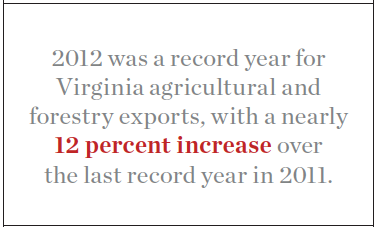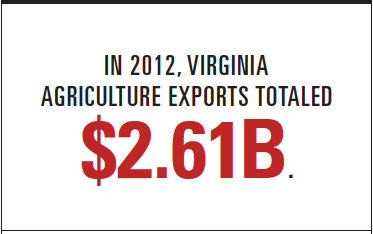Home > Virginia > Virginia Crops & Livestock > Virginia Agricultural Exports are Open for Business
Virginia Agricultural Exports are Open for Business
In partnership with: Virginia Department of Agriculture and Consumer Services
Virginia has been exporting agricultural products since the early settler John Rolfe shipped his first crop of tobacco to England back in 1612, but the state’s international market has never seen times like today.
With countries like China and Canada leading the way, Virginia reached unprecedented levels in agricultural exports for 2012, breaking the previous record from 2011 by almost 12 percent. The state shipped $2.61 billion of products to countries outside the United States, with China accounting for $638 million (an increase of nearly 230 percent in just two years) and Canada totaling $205 million. Somewhat surprisingly, perhaps, Morocco was third with around $139 million in goods purchased.
Other leading countries included Switzerland, Turkey, Saudi Arabia, Indonesia, Vietnam, Venezuela and Cuba.
Virginia has a wide range of agricultural products to export, including soybeans, chicken meat, wood products, unmanufactured leaf tobacco, a variety of grains, pork, animal feed, cotton, seafood and raw peanuts, among others.
State Impact
In terms of its economic impact, Virginia’s export industry generates approximately $1.40 in-state for every $1 shipped out, according to the Virginia Department of Agriculture and Consumer Services (VDACS). This means revenue for farmers and producers, as well as processors, ports and others along the business chain.
“Virginia has been very proactive in promoting exports out of the state,” says John Cassidy, senior vice president of Perdue Grain and Oilseed, a company that owns and operates a major deepwater export terminal in Chesapeake, Virginia. Perdue works closely with officials from VDACS in international marketing to maximize the export of soybean and grain using their Virginia terminal.
“Our first mutual project was arranging to export soybeans and soybean meal to Cuba,” Cassidy adds, “and we’ve been doing that now for close to 10 years. That was through the very strong efforts of both the previous governors and the department of agriculture. They [VDACS] continue to visit Cuba, as do we, in order to promote not only exports of soybean products but various other products from Virginia such as wine and apples.”
Regional Representation
But in addition to making strategic and timely visits to various countries, VDACS is expanding its export efforts by opening regional offices in key marketplaces around the world. The department has had an office in Hong Kong for a number of years, where David Wong resides as the representative for Japan, Korea, Malaysia, Indonesia and other countries in the Asia Pacific region. The department has recently opened an office in Shanghai as well.
The representation in China helped business there for Perdue Grain and Oilseed, according to Cassidy. A subsidiary of Perdue Agribusiness Inc., Perdue Grain and Oilseed produces and sells feed-grade soybean meals, pelleted soy hulls and crude soy oils. It entered into an agreement fostered by Virginia’s governor with a Chinese company called Dandong.
“That is very significant in the amount of soybeans we’ve moved out of our facility and to China,” Cassidy says. “This is our third year, and each year the volume has increased in terms of the soybeans we’re shipping.”
Ted Horton represents VDACS exports from his office just outside of London, covering European markets. Many countries in Europe import seafood from Virginia, and Horton has a background working with seafood products. The continent is also increasing its imports of Virginia wood pellets that are used as a source for sustainable energy. In addition, the department has an affiliate office in St. Petersburg, Russia, a country that imports live cattle and apples from the state.
A representative is covering Latin American countries from an office in Mexico and a satellite office in Costa Rica. In November of 2013 someone was added in Canada as well, a market that’s ideal not only for refrigerated or frozen products but also fresh produce and hardwood lumber from Virginia.






